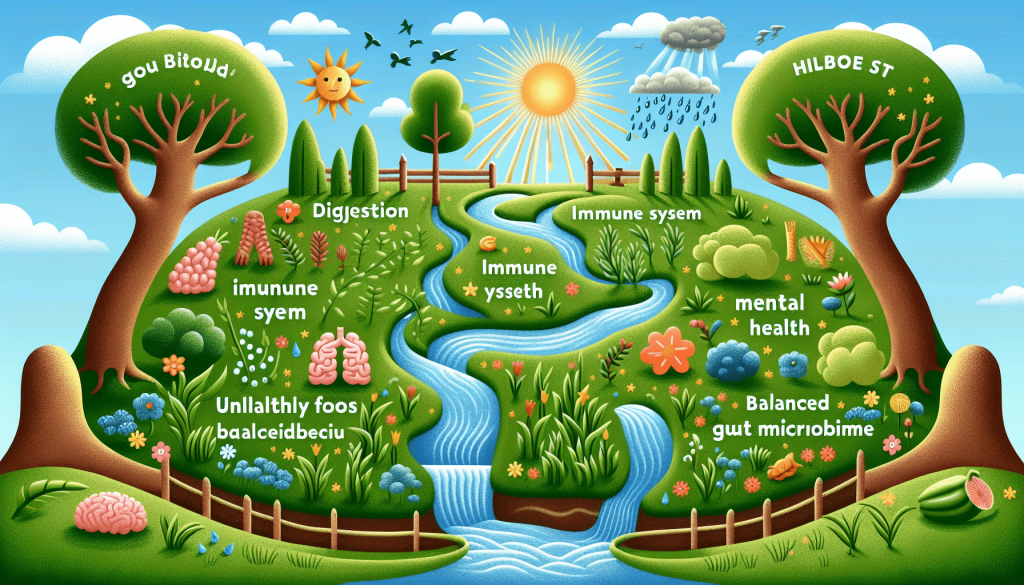Imagine a world where every ache, pain, and illness was influenced by one simple factor: your gut health. Surprisingly, this seemingly insignificant part of our body holds immense significance in shaping our overall well-being. From digestion to immunity, our gut is a powerhouse that plays a pivotal role in keeping us healthy and vibrant. The importance of gut health cannot be overstated, as it is the foundation upon which our entire body operates. So buckle up as we embark on a journey to unravel the mysteries of this crucial aspect of our well-being.
What is Gut Health?
The definition of gut health
Gut health refers to the overall well-being of your gastrointestinal system, which includes the stomach, small intestine, and large intestine. It is the optimal functioning of these organs and the balance of the gut microbiome that contribute to good gut health.
The role of the gut microbiome
The gut microbiome is a complex ecosystem of trillions of microorganisms, including bacteria, viruses, fungi, and other organisms, that reside in your digestive tract. These microorganisms play a vital role in digestion, nutrient absorption, immune system regulation, and overall health. They help break down food, produce key nutrients, regulate inflammation, and educate the immune system.
Factors Affecting Gut Health
Diet and nutrition
Your diet and nutrition significantly impact your gut health. A balanced and varied diet that includes ample amounts of fiber, fruits, vegetables, and probiotic-rich foods supports a healthy gut. On the other hand, a diet high in processed foods, sugar, and unhealthy fats can disrupt the balance of gut bacteria and lead to poor gut health.
Stress and mental health
Stress and mental health can have a profound impact on your gut health. Chronic stress and anxiety can disrupt the balance of gut bacteria and impair digestion. The gut and brain are closely connected through the gut-brain axis, and imbalances in gut bacteria can contribute to mood disorders such as depression and anxiety.
Medications and antibiotics
Certain medications, especially antibiotics, can negatively affect gut health. Antibiotics kill both harmful and beneficial bacteria in the gut, which can lead to an imbalance and increase the risk of digestive issues, weakened immune system, and other health problems. It is important to use antibiotics only when necessary and to consider probiotic supplementation during and after antibiotic treatment.
Physical activity and exercise
Regular physical activity and exercise have been shown to promote a healthy gut. Exercise increases blood flow to the intestinal tract, stimulates the release of beneficial compounds, and modulates gut bacteria. Engaging in physical activity can help regulate digestion, improve nutrient absorption, and enhance overall gut health.

Importance of Gut Health
Digestion and nutrient absorption
One of the primary functions of the gut is to break down food and absorb nutrients. A healthy gut ensures efficient digestion and optimal absorption of essential vitamins, minerals, and other nutrients. When the gut microbiome is balanced, it helps in the breakdown of food particles and the production of enzymes necessary for digestion.
Immune system functionality
Approximately 70% of our immune system resides in the gut, making gut health crucial for a robust immune system. The gut microbiome interacts with immune cells, helping to regulate immune responses, prevent inflammation, and defend against pathogens. A healthy gut microbiome improves immune system functionality, reducing the risk of infections and autoimmune disorders.
Mood and mental health
Research has shown a strong link between gut health and mental health. The gut microbiome produces neurotransmitters, such as serotonin, dopamine, and GABA, which play a crucial role in regulating mood and mental well-being. A healthy gut contributes to a balanced production of these neurotransmitters, promoting positive mental health and reducing the risk of mood disorders.
Overall well-being
Optimal gut health is essential for overall well-being. When your gut is functioning properly, you are more likely to experience good energy levels, healthy weight management, better sleep, improved skin health, and a stronger immune system. By taking care of your gut, you are taking a proactive step towards enhancing your overall health and vitality.
Signs of Poor Gut Health
Digestive issues
Digestive issues such as bloating, gas, diarrhea, constipation, and irritable bowel syndrome (IBS) are common signs of poor gut health. These symptoms may be indicative of an imbalance in the gut microbiome, inadequate digestion, or inflammation in the digestive tract. If you frequently experience digestive problems, it is a sign that your gut health may need attention.
Weakened immune system
Frequent illnesses, infections, and slow recovery from illnesses can be signs of a weakened immune system, often linked to poor gut health. The gut microbiome plays a crucial role in supporting immune system functionality and defending against harmful pathogens. If your immune system seems compromised, it might be time to pay attention to your gut health.
Mood disorders
Imbalances in the gut microbiome can impact neurotransmitter production, leading to mood disorders such as depression, anxiety, and even brain fog. If you find yourself experiencing persistent feelings of sadness, anxiety, or difficulty concentrating, it could be a sign of poor gut health affecting your mental well-being.
Skin problems
Skin conditions such as acne, eczema, and psoriasis are often related to gut health. Inflammation and imbalances in the gut can contribute to skin problems, as the gut and skin share a close connection. If you experience chronic skin issues that do not respond well to treatment, it may be worth addressing your gut health.

Maintaining a Healthy Gut
Balanced diet with fiber and probiotics
A balanced diet with plenty of fiber-rich foods such as fruits, vegetables, whole grains, and legumes promotes a healthy gut. Fiber acts as a prebiotic, providing nourishment to beneficial gut bacteria. Including probiotic-rich foods like yogurt, kefir, sauerkraut, and kimchi can also support a healthy gut by introducing beneficial bacteria.
Managing stress levels
Practicing stress management techniques such as meditation, deep breathing exercises, yoga, and regular relaxation can have a positive impact on gut health. Chronic stress disrupts the balance of gut bacteria and impairs digestion. Finding effective ways to manage stress can help maintain a healthy gut.
Avoiding unnecessary antibiotic use
Use antibiotics judiciously and only when necessary to avoid disrupting the delicate balance of gut bacteria. If prescribed antibiotics, consider taking probiotics concurrently to support the restoration of a healthy gut microbiome. Discuss with your healthcare provider about the appropriate use and potential alternatives to antibiotics.
Regular physical activity
Engaging in regular physical activity and exercise benefits overall gut health. Exercise promotes blood flow to the intestines and stimulates the release of beneficial compounds that support a healthy gut microbiome. Aim for at least 30 minutes of moderate-intensity exercise most days of the week to support a healthy gut.
Probiotics for Gut Health
What are probiotics?
Probiotics are live bacteria and yeasts that are beneficial to the gut microbiome and overall health. They help restore and maintain a healthy balance of gut bacteria, which is crucial for optimal gut health. Probiotics can be consumed through certain foods or dietary supplements.
Benefits of probiotics for gut health
Probiotics offer numerous benefits for gut health. They help improve digestion, reduce the risk of diarrhea, alleviate symptoms of irritable bowel syndrome (IBS), support the breakdown of food particles, produce essential vitamins, and strengthen the gut barrier. Probiotics have also been associated with improved immune function and mental well-being.
Sources of probiotics
Probiotics can be found in various food sources, including yogurt, kefir, sauerkraut, kimchi, tempeh, miso, and certain types of cheese. These foods contain live cultures of beneficial bacteria that can help support a healthy gut. Additionally, probiotic supplements are available in various forms and strains, providing targeted support for specific gut health concerns.

Prebiotics and Gut Health
What are prebiotics?
Prebiotics are a type of dietary fiber that serves as food for beneficial gut bacteria. They are non-digestible, meaning they pass through the digestive system largely unaffected, reaching the colon where they are fermented by gut bacteria. Prebiotics help nourish and support the growth of beneficial bacteria in the gut.
Importance of prebiotics for gut health
Prebiotics play a crucial role in maintaining a healthy gut microbiome. By providing food for beneficial bacteria, prebiotics encourage the growth and activity of these microbes, helping maintain a balanced gut environment. This, in turn, supports optimal digestion, nutrient absorption, and immune system functionality.
Sources of prebiotics
Prebiotics can be found in various foods such as garlic, onions, leeks, asparagus, bananas, oats, and flaxseeds. These foods are rich in fibers like inulin, fructooligosaccharides (FOS), and resistant starch, which serve as prebiotics. Including these fiber-rich foods in your diet can promote a healthy gut microbiome.
Foods for Gut Health
Fiber-rich foods
Fiber-rich foods such as whole grains, fruits, vegetables, legumes, and nuts are essential for gut health. They support regular bowel movements, prevent constipation, and provide prebiotics that nourish beneficial gut bacteria. Aim to include a variety of fiber-rich foods in your meals to promote a healthy gut.
Fermented foods
Fermented foods are rich in probiotics and can contribute to a healthy gut microbiome. Examples include yogurt, kefir, sauerkraut, kimchi, tempeh, miso, and kombucha. These foods undergo a natural fermentation process, resulting in the growth of beneficial bacteria. Adding fermented foods to your diet can enhance gut health.
Omega-3 fatty acids
Omega-3 fatty acids found in fatty fish, walnuts, flaxseeds, and chia seeds have anti-inflammatory properties that can benefit gut health. They help reduce inflammation in the gut and support optimal gut function. Including omega-3-rich foods in your diet can help maintain a healthy gut.
Bone broth
Bone broth, made from simmering animal bones and connective tissues, is rich in collagen, gelatin, and amino acids. These nutrients support gut integrity and help repair the gut lining. Consuming bone broth as part of a balanced diet can promote gut health and aid in the healing of the digestive tract.

Lifestyle Habits for Gut Health
Getting enough sleep
Adequate sleep plays a crucial role in gut health. Poor sleep quality and duration can disrupt the balance of gut bacteria and contribute to digestive issues. Aim for 7-9 hours of restful sleep each night to support your gut health.
Managing stress
Chronic stress has detrimental effects on gut health. Implement stress management techniques such as meditation, yoga, deep breathing exercises, and engaging in hobbies to reduce stress levels. Taking steps to manage stress effectively can positively impact your gut health.
Limiting processed foods
Processed foods often lack the essential nutrients and fiber necessary for a healthy gut. They may also contain additives and preservatives that can disrupt gut microbiota. Opt for whole, unprocessed foods whenever possible to support optimal gut health.
Hydrating adequately
Staying adequately hydrated is essential for a healthy gut. Water helps maintain proper digestion, softens stool, and supports regular bowel movements. Aim to drink at least 8 glasses of water per day or more if you are physically active or live in a hot climate.
Seeking Professional Help
When to consult a healthcare professional
If you experience persistent digestive issues, frequent infections or illnesses, unexplained weight loss or gain, or severe changes in mood and mental well-being, it is advisable to seek guidance from a healthcare professional. They can assess your gut health and provide appropriate recommendations or refer you to a specialist if needed.
Tests and assessments for gut health
Healthcare professionals can utilize various tests and assessments to evaluate gut health. These may include stool tests to analyze the composition of gut bacteria, blood tests to assess inflammation markers, food intolerance tests, and other diagnostic tools that provide insights into gut health and functioning.
Treatment options for gut-related disorders
Treatment options for gut-related disorders will depend on the specific condition and severity. Healthcare professionals may recommend dietary changes, probiotic or prebiotic supplementation, medications to address underlying issues, lifestyle modifications, and stress management techniques. They will work with you to develop a personalized plan to improve gut health and overall well-being.
In conclusion, gut health plays a crucial role in overall well-being, digestion, immune system functionality, and mental health. By adopting a balanced diet, managing stress levels, incorporating physical activity, and prioritizing healthy lifestyle habits, you can support and maintain a healthy gut. Including probiotics and prebiotics in your diet, consuming gut-friendly foods, and seeking professional help when needed can further enhance your gut health journey. Remember, taking care of your gut is an investment in your long-term health and vitality.









